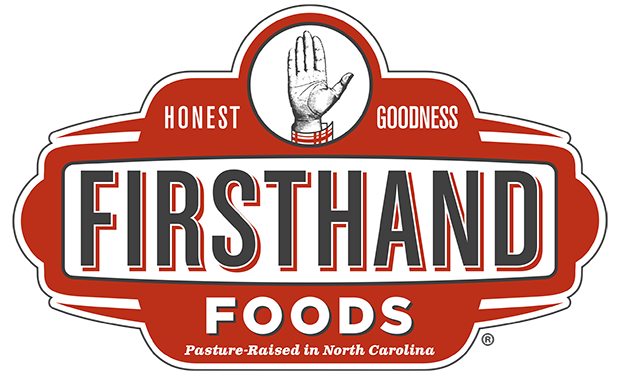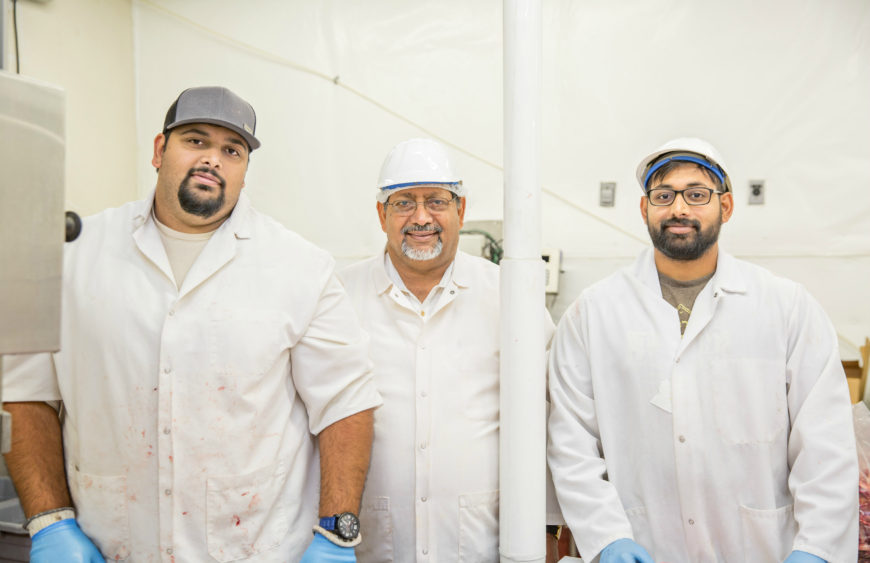Abdul Chaudhry started working in meat processing for a very simple reason: he and his family saw a need, and they decided to meet it. At 16 years old, Abdul had emigrated from Pakistan to the United States with his father and brother, moving in at an uncle’s farm in Siler City. Soon after arrival, the family realized that there was no halal meat available in the region. So Abdul and his father began buying animals from neighboring farms and slaughtering them according to halal ritual.
Initially, the family slaughtered cattle, goats, and sheep under a tree in their backyard and butchered them out in the open air. Through word of mouth, news spread throughout the region’s Muslim communities that if you drove to Siler City, you could get halal meat. Before long, the Chaudhrys were spending every weekend slaughtering, processing, and distributing meat. From Saturday morning to Sunday night, Abdul says, the house would be full of families swinging by to pick up their orders. His father never let visitors leave without sharing a meal. Eventually, as demand grew, Abdul and his brother turned one of the empty outbuildings on the family farm into a processing room.
Abdul didn’t have a background in meat processing. “I didn’t even know what a ribeye was when I started doing this,” he says, laughing. But as community demand for halal meat grew, he taught himself. He borrowed a video recorder, reached out to a butchery in Fayetteville, and taped workers breaking down an animal from start to finish. Then he went home and set up a VCR in his processing room. After getting off work, he would watch the video in slow motion as he practiced cutting meat. It turned out he had a real knack for it; of all the jobs at the plant, cutting meat remains his favorite. “It’s like art for me,” he says.
For years, the Chaudhrys processed meat for free, as a service for the community. When people came to pick up their share, Abdul would simply show them the receipt for the purchase of the animal and they would reimburse him. But as word spread, the Chaudhrys began to sell meat by the pound, delivering it around the region to places like the Raleigh Islamic Center.
Abdul continued to work full-time jobs to provide for his wife and children, working at Taco Bell and in management at Sara Lee. But he knew he wanted to create a viable meat processing business, even if it meant long hours. “Some mornings I would wake up at 2 am, drive to Lumberton to slaughter 500 halal chickens, then drive back here to show up for my afternoon shift,” he remembers. “But I wanted to build something for my family. I couldn’t just sit back and see what happened.”
When the USDA finally caught wind of Abdul’s operation, he had been processing and distributing meat from the family farm for 11 years. “I was a meat bootlegger for a long time!” he says with a smile. Inspectors told him he needed to build a formal processing facility. Serendipitously, there was a recently shuttered plant for sale just down the road. Abdul quickly signed a lease, agreeing that he’d pay in monthly installments until he owned the place outright.
It wasn’t an easy transition from backyard slaughtering to running a large-scale facility. Initially, Abdul staffed the processing plant with only three workers – his father, his wife, and himself – and it took him years before he was able to begin cutting himself a paycheck. Even after that, it was difficult to keep a small processing facility afloat. “I worked 18 hours a day for 18 years,” he says.
But all that dedication paid off. Today, the plant has 28 employees, and Abdul prides himself on paying them some of the best wages in the business. On average, he says, employees have worked there for 9 years. When asked if he trained all of his employees himself, he nods. “But now they’ve been doing it for so long, I’m sure many of them could train me!” Each week, they process about 80 cattle, 125-150 lambs, and 200 goats. They are the only beef processing plant in North Carolina that is approved by Whole Foods.
The same commitment to community that motivated Abdul to start processing meat in the first place still drives his business. Every year for the Muslim festival of Eid, the plant hosts celebratory meals for employees and for the broader Muslim community of Eastern Carolina. “It’s like the United Nations in here!” Abdul says. “All different languages, all different styles of clothing… but everyone coming together to celebrate, year after year.” He also recently purchased an office building in Siler City, which he renovated and reopened as the city’s first Islamic Center in March 2018. The project was motivated by the birth of his first grandchild. “When my sons were little, they would drive with me to deliver meat to the Raleigh Sunday School. All the other children would be getting out, and they would be there with me working. When my granddaughter was born, I realized I didn’t want her to grow up without access to a religious education,” he says.
Abdul’s children have been involved in the plant since they were young. Now, his sons Wasim and Atiq largely run the business, though Abdul continues to manage the allocation of live animals. He also, finally, is able to take a little time to relax. Though the family still keeps the farm where they first began processing, Abdul and his wife now live on their own land, where they keep a small herd of grazing cattle. Especially after a long or stressful day, Abdul says with a smile, he loves to come and take a quiet walk by the creek. “It’s so peaceful, so meditative… You know, when I first came to America, I spent one night in New York, then came to Siler City on my second day. And I’ve lived here ever since. It’s home.”

